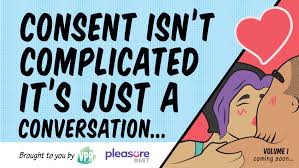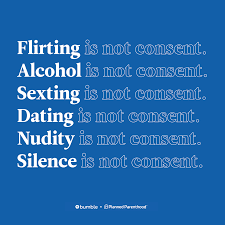HOW TO PRACTICE GOOD CONSENT

by
SUZANNAH WEISS
______________________________________________________
Suzannah Weiss is a freelance writer and editor
who currently serves as a contributing editor for
Teen Vogue
and
Complex. She authored a chapter of
Here We Are:
Feminism for the Real World. Her writing has also appeared
in
The Los Angeles Times, The Village Voice, Cosmopolitan,
Elle, Marie Claire, Harper’s Bazaar, Seventeen, Bitch, Bust,
Women’s Health, Paper, Paste, Redbook, Good Housekeeping,
Mic, Business Insider, Buzzfeed, The Huffington Post, Alternet,
Thought Catalog, Pop Sugar, xoJane, MEL, and much more. For
more of Suzannah's writing and thinking, please visit her
website.
Twitter link = @suzannahweiss
Thanks
to the #MeToo movement, people are becoming more conscious of
how they treat others' sexual boundaries. Yet there's still some
confusion over what constitutes sexual consent. Even those with
the best of intentions can disrespect others' boundaries if they
don't understand how to respect them.
That's
where Sexual Consent, a book forthcoming from MIT Press
in May 2019 by blogger, activist and University of the West of
England researcher Milena Popova, comes in. Sexual Consent
teaches readers the concepts and terminology that are essential
to know if you want  to
practice good consent in your sex life.
to
practice good consent in your sex life.
"We
tend to think of consent as this very binary thing," Popova
tells Bustle. "It was either consent or it was rape,
and there's a very sharp dividing line between them. That's the
way the law thinks about it: If we can't prove it was rape, then
it must have been consent, the end. But actually, like pretty
much anything to do with sex, consent can be quite messy. It involves
humans and emotions. And it's enmeshed in all sorts of social
and power structures."
What
makes consent even more complex is that even when people do seemingly
consent, they're often consenting under pressure, either from
a partner or from society, which isn't true consent. Consent is
"shaped as much -- if not more -- by what we think we should
do and want as by what we actually want," says Popova. "So,
that legalistic perspective -- it was either one or the other
-- isn't very helpful on a day-to-day level if we want to make
sure the sex we're engaging in is genuinely consensual. On that
level, we need to bear in mind that we and our partners are complicated,
messy human beings, be attuned to each other's feelings and responses,
and respect each other's boundaries." Here are some terms
and concepts from Sexual Consent that you should learn
if you want to be the most respectful partner you can be.
SEXUAL
SCRIPTS
A sexual
script is a societal idea of how sex is supposed to go. For instance,
the dominant sexual script in American society goes something
like "kissing, foreplay, intercourse." The problem with
this is that it promotes a limited definition of sex, which in
turn promotes a limited definition of sexual assault.
"Your
bodily autonomy is still violated by being kissed or touched against
your will, not only by being penetrated against your will,"
Popova writes. Therefore, we need to stop viewing activities like
kissing and touching as expressions of consent for intercourse
(which they're not) and view them as acts that require consent
in of themselves. And we shouldn’t make assumptions about
what someone  consents
to based on sexual scripts; we should take the time to find out
what kinds of sex they enjoy.
consents
to based on sexual scripts; we should take the time to find out
what kinds of sex they enjoy.
CONDITIONAL
CONSENT
Consenting
to a sexual act does not mean consenting to every form of it at
any time. For example, if someone consents to intercourse, they
may only be consenting on the condition that a condom is used
-- which is why stealthing (non-consensual condom removal) is
a form of sexual assault.
"Saying
that consent can be conditional means that you can say 'yes, I
want to do this with you, but only on these conditions,'"
Popova writes. "Consent to penetration can be conditional
on condom use, consent to oral sex can be conditional on the use
of dental dams, and consent to having an open relationship or
multiple partners can be conditional on regular STI testing. But
there are also other situations where conditional consent applies.
For sex workers, for instance, consent is conditional on being
paid for their work." So, again, it's important not to make
assumptions and to discuss the specifics of what your partner
wants.
CONTRACTUAL
CONSENT
Unfortunately,
our society often views consent as contractual -- i.e., like an
economic exchange. Contractual consent is "the idea that
certain unrelated actions by one partner generate an obligation
for another partner to engage in sexual activity," Popova
writes. The stereotypical situation, for example, is that a woman
provides sex in exchange for long-term commitment or financial
support from a man.
The problem
with this model is that it implies that one person owes the other
person sex, rather than both people having it because they mutually
want to. Even in cases like sex work where someone has sex to
get something from their partner, this person always has the right
to withdraw consent.
CONTINUOUS
CONSENT
Speaking
of withdrawing consent, anybody can always withdraw consent at
any time. Consent must be continuous, which means that "you
are allowed to change your mind about what you are doing at any
point during a sexual situation, for any reason," Popova
writes. This also means it's important to keep checking in with
your partner to make sure they consent to each act you engage
in.
 If
you're not comfortable with a sexual encounter, you can just say,
"Hey, I don’t want to do this anymore," Popova
suggests. You can also say something more specific to take the
encounter in a new direction, like, “Let’s do something
else that’s fun for both of us.”
If
you're not comfortable with a sexual encounter, you can just say,
"Hey, I don’t want to do this anymore," Popova
suggests. You can also say something more specific to take the
encounter in a new direction, like, “Let’s do something
else that’s fun for both of us.”
INDIRECT
COMMUNICATION
People
sometimes say that sexual assault victims should have been firmer
in saying "no" to make it clear that the advances weren't
welcome. But women are socialized to avoid direct communication
like this, Popova points out, and often, subtler forms of communication
are clear enough for the perpetrator to get the message -- they
just decide to take advantage of the indirect communication by
pretending it's unclear.
After
all, there are other situations where people accept indirect forms
of "no." For example, to decline an invitation, you
might say, “I can’t go out for a beer tonight, I’m
playing football" or “Not right now, thanks, but maybe
later," Popova points out. It's not always easy to just say
"no." That's why affirmative consent, where only "yes"
means yes, is a better standard than "no means no."
NON-SEXUAL
CONSENT
The call
to honour people's bodily autonomy applies to much more than sex.
Teaching people about consent also means teaching children they
don't have to hug their relatives, teaching adolescents not to
pressure anyone to go out with them, and teaching people to ask
before making physical contact with anyone.
Whatever
your boundaries are, people should respect all of them just as
they'd respect your sexual boundaries. "Preferring to be
addressed by a nickname rather than your full name may be a boundary,"
Povova writes. "Being comfortable in small groups but not
in large gatherings may be a boundary. Not liking certain foods
or preferring handshakes over hugs are also examples of nonsexual
boundaries we may set for ourselves."
INTIMATE
PARTNER VIOLENCE
The stereotype
of a sexual assault occurring at the hands of a stranger in a
dark alley does not represent most assaults. In fact, one in 10
people has been the victim of rape by a partner, according to
the Washington Coalition of Sexual Assault Programs. Due to traditional
views of marriage as the possession of a woman by a man, many
people don't even realize that non-consensual sexual activity
with a spouse or intimate partner is assault. Spousal rape is
even treated differently than other kinds of rape in some U.S.
states.
No matter
how long you've been dating someone, it's important to make sure
they consent to anything sexual you do together. "While in
saying 'I do' you promise to do quite a lot of things, letting
your spouse use your body for their sexual gratification whenever
they want to is not one of them," writes Popova.
The #MeToo
movement has helped more sexual assault survivors come forward
and feel validated that what happened to them was wrong and not
their fault. But we need to go further than that by practicing
good consent in our own sex lives, and learning the nuances of
affirmative consent is a good place to start. Talk to your partner
about boundaries before you're even in the bedroom, check in with
them while you're having sex, and talk about your sex life afterward
to make sure everybody's feeling comfortable and respected.